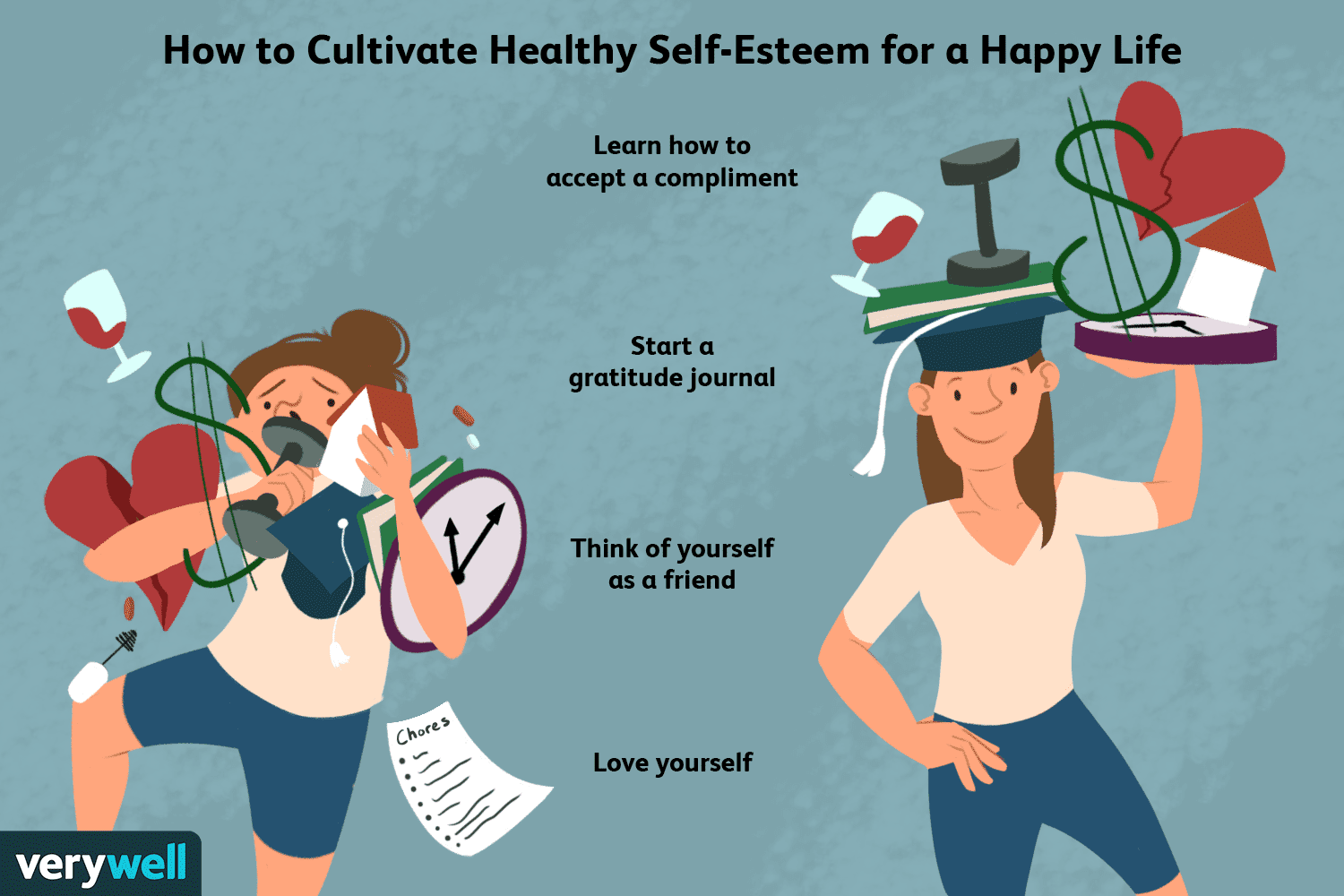Life style
Evidence-Based Therapeutic Approaches for Boosting Self-Esteem

Key Takeaways:
– Understanding the role of therapy in bolstering self-esteem.
– Identifying signs of low self-esteem and when to seek help.
– Exploring various therapeutic techniques for self-improvement.
– Highlighting the benefits of Self-Esteem Therapy for personal growth.
The journey toward improved self-esteem is critical for anyone aiming to lead a fulfilling life. High self-esteem is the cornerstone of mental resilience, encouraging one to venture confidently, face challenges assertively, and acknowledge one’s inherent worth. Conversely, low self-esteem can cloud judgment, distort self-view, and block opportunities for growth. It is where Self-Esteem Therapy comes into play, serving as a bridge over treacherous waters, guiding individuals from self-doubt to self-assurance with the help of professional therapeutic interventions.
When to Consider Therapy for Self-Esteem Issues
Choosing to seek treatment is an essential and admirable decision.zsAQa It becomes pertinent when self-deprecating thoughts become routine or when one’s history — a string of failed relationships, traumatic events, or chronic bullying, for instance — seems to overshadow present experiences continuously. In such cases, professional help can break the cycle of negativity and facilitate the journey to self-acceptance and appreciation.
Different Types of Therapeutic Techniques for Self-Esteem
Effective therapy for self-esteem issues can take various forms, each targeting different facets of self-perception. Cognitive-behavioral therapy (CBT) is well-known for its effectiveness in treating negative thinking and behavior patterns. It helps individuals challenge and reframe the cognitive distortions that feed into their low self-esteem. Mindfulness practices within the therapeutic setting emphasize staying attuned to the present moment and fostering a non-judgmental awareness of oneself, which can lead to profound self-discovery and acceptance. Self-compassion exercises are designed to cultivate a gentler, more forgiving inner dialogue, counteracting the critical voice that often plagues those with low self-esteem. Combined, these approaches can form a robust framework for sustainable self-image improvement.
The Benefits of Non-Judgmental Spaces in Therapy
In the therapeutic realm, the creation of a non-judgmental space is paramount. Such environments enable individuals to express vulnerabilities without fear, delve into painful past experiences, and, crucially, start the process of healing and self-acceptance. Having a skilled therapist to guide this exploration can inspire individuals to embrace aspects of themselves they have previously shunned, thereby facilitating holistic self-esteem growth.
Setting Realistic Goals and Celebrating Small Wins
Goal-setting within therapy provides a structured approach to overcoming self-esteem issues. Objectives should be clear, attainable, and measurable, and as each one is reached, it is essential to take the time to celebrate these milestones. It not only bolsters self-esteem but also reinforces the effectiveness of therapy. Whether it’s managing to dissent in a group without succumbing to the pressure to conform or finally starting a hobby long-postponed due to self-doubt, these victories, however small, pave the way for larger ones.
Recognizing the Signs of Low Self-Esteem
Detecting low self-esteem necessitates a keen awareness of behavioral, physical, and emotional patterns. Physical symptoms might include a disregard for personal grooming or chronic fatigue, often emerging from neglecting one’s health or a lack of motivation. Emotionally, one might experience frequent bouts of unwarranted guilt, a pervading sense of incompetence, or persistent worry about how others perceive them. Socially, avoiding challenges or interpersonal interactions due to fear of failure or judgment can indicate deeper self-esteem issues. Psychology Today’s overview of self-esteem elucidates how these behaviors can create a feedback loop, perpetuating the negative self-image.
Overcoming Obstacles and Building Resilience
Part of building self-esteem involves developing resilience to life’s inevitable challenges. Setbacks and failures, when viewed through a constructive lens, become growth opportunities. In therapy, individuals learn to shift their focus from avoiding failure to embracing learning; a mindset shift quintessential for developing hardiness and improving self-esteem over time.
Measuring Progress in Self-Esteem Therapy
In therapeutic settings, it’s essential to measure progress not solely as an assessment for the therapist but as a self-reflective tool for the individual. Therapists might employ specific scales or questionnaires to evaluate advances quantitatively. Nevertheless, self-reporting, where individuals articulate their feelings of self-worth and document subjective changes, can be just as revealing. Tracking these outcomes helps maintain momentum in the therapeutic process and provides concrete evidence of improvement.
How Self-Esteem Therapy Improves Relationships and Professional Life
The ripple effects of bolstered self-esteem extend far beyond the individual, impacting personal relationships and professional realms. People with healthy self-esteem establish boundaries more effectively, communicate their needs more clearly, and engage with others from a place of strength rather than insecurity. Professionally, they are more inclined to take calculated risks, seek leadership opportunities, and contribute meaningfully to their vocations.
Life style
The Perfect Guide to Choosing Anniversary Flowers

Introduction
Anniversaries are special milestones that celebrate love, commitment, and cherished memories. One of the most timeless and heartfelt ways to express your affection is through flowers. Whether it’s your first anniversary or your fiftieth, the right floral arrangement can convey emotions words sometimes can’t. This guide explores the significance of anniversary flowers, popular choices, and tips for selecting the perfect bouquet. We’ll also discuss the convenience of anniversary flowers delivery and how to make your gift even more memorable.
The Significance of Flowers in Anniversary Celebrations
Flowers have been symbols of love and devotion for centuries, with different blooms carrying unique meanings. Opting for anniversary flowers delivery ensures your gift arrives fresh and beautifully arranged, making the occasion even more special.
Key reasons flowers are perfect for anniversaries:
- Romantic Symbolism – Roses, lilies, and tulips represent love and passion.
- Personalized Messages – Different colors convey distinct emotions (red for love, pink for admiration).
- Timeless Elegance – A well-chosen bouquet enhances any celebration.
Whether you’re near or far, having flowers delivered adds a thoughtful touch to your anniversary surprise.
Best Flower Choices for Different Anniversaries
Each anniversary year has traditional and modern floral associations. Here are some ideal picks:
- 1st Anniversary (Paper) – Carnations (symbolizing young love)
- 5th Anniversary (Wood) – Daisies (representing loyalty and simplicity)
- 10th Anniversary (Tin/Aluminum) – Daffodils (symbolizing joy and renewal)
- 25th Anniversary (Silver) – Irises (meaning wisdom and admiration)
- 50th Anniversary (Gold) – Yellow roses (celebrating enduring love)
Matching flowers to the anniversary year adds a meaningful layer to your gift.
Factors to Consider When Choosing Anniversary Flowers
Before selecting a bouquet, keep these aspects in mind:
- Recipient’s Preferences – Favorite flowers or colors make the gift more personal.
- Seasonal Availability – Peonies in spring, sunflowers in summer, etc.
- Arrangement Style – Classic roses, mixed bouquets, or elegant orchids.
- Fragrance – Some flowers, like lilies, have a strong scent, while others are subtle.
A well-considered choice ensures your flowers resonate deeply with your partner.
Why Fresh Flowers for Anniversaries Make the Best Gift
While chocolates and jewelry are great, flowers for anniversaries remain a classic for good reason:
- Instant Emotional Impact – Bright, fresh blooms create an immediate sense of joy.
- Versatility – Suitable for any anniversary, whether casual or grand.
- Customization Options – Add-ons like chocolates, vases, or handwritten notes enhance the gift.
- Symbolic Longevity – Just as love grows, flowers can be preserved as keepsakes.
A beautifully arranged bouquet is a gesture that never goes out of style.
Tips for Preserving Anniversary Flowers
Make your floral gift last longer with these care tips:
- Trim Stems Diagonally – Helps flowers absorb water better.
- Change Water Daily – Prevents bacterial growth.
- Keep Away from Direct Sunlight – Extends freshness.
- Use Flower Food – Packets provided with bouquets help nourish blooms.
For a lasting memory, consider drying petals or pressing them in a frame.
Unique Ways to Present Anniversary Flowers
Go beyond the traditional bouquet with these creative ideas:
- Flower Subscription – Monthly deliveries to keep the celebration ongoing.
- Flower Wall or Petal Path – For a grand romantic gesture.
- Personalized Message-in-a-Bottle – Combine flowers with a heartfelt letter.
- Surprise Delivery at Work – Make their day extra special.
Adding a personal twist makes the gift unforgettable.
Conclusion
Anniversary flowers are more than just a gift—they’re a timeless expression of love. Whether you choose a classic red rose bouquet or a modern mixed arrangement, the right flowers can make your anniversary unforgettable. With the convenience of anniversary flowers delivery, you can surprise your loved one no matter where you are. And when you select the perfect flowers for anniversaries, you’re not just giving a beautiful present—you’re celebrating your journey together in the most heartfelt way. Choose wisely, and let your flowers speak the language of love.
Life style
Rejuvenation Skin Care: Your Guide to Timeless Beauty and Healthy Skin

Introduction
In today’s fast-paced world, maintaining healthy, youthful skin requires professional care and advanced treatments. At Re-juvenation Skin Care Clinic, we combine science-backed techniques with personalized attention to help you achieve your skincare goals. Whether you’re seeking preventive maintenance or transformative results, our classic Re-juvenation Skin Care Clinic approach blends time-tested methods with cutting-edge technology. This comprehensive guide explores our philosophy, services, and what makes professional skin rejuvenation different from at-home routines.
The Re-juvenation Skin Care Clinic Philosophy
Our Re-juvenation Skin Care Clinic operates on three core principles:
Personalized Treatment Plans
- Comprehensive skin analysis
- Custom-blended product formulations
- Condition-specific protocols
Science-Based Approaches
- Medical-grade equipment
- Clinically proven ingredients
- Results-driven methodologies
Holistic Wellness Integration
- Nutritional counseling
- Stress management techniques
- Lifestyle optimization advice
We treat skin as an organ reflecting overall health, not just a surface to be decorated.
Common Skin Concerns We Address
Our clinic specializes in treating:
✔ Aging-Related Issues
- Fine lines and wrinkles
- Loss of elasticity
- Age spots and pigmentation
✔ Environmental Damage
- Sun damage repair
- Pollution protection
- Dehydration reversal
✔ Medical Conditions
- Acne and rosacea
- Eczema and psoriasis
- Scarring and stretch marks
✔ Preventive Maintenance
- Collagen stimulation
- Barrier function strengthening
- Early intervention strategies
Each concern requires specialized treatment protocols for optimal results.
Our Signature Treatment Technologies
We invest in medical-grade equipment for superior outcomes:
Resurfacing Modalities
- Fractional laser treatments
- Medical microdermabrasion
- Chemical peel systems
Stimulation Therapies
- Radiofrequency skin tightening
- Microcurrent facial toning
- LED light therapy
Injection Techniques
- Neuromodulators for dynamic wrinkles
- Dermal fillers for volume restoration
- Mesotherapy for nutrient delivery
All procedures are performed by licensed professionals with extensive training.
The Classic Re-juvenation Skin Care Clinic Experience
Our classic Re-juvenation Skin Care Clinic package includes:
Consultation Process
- Detailed skin mapping
- VISIA complexion analysis
- Lifestyle assessment
Treatment Protocol
- Deep cleansing preparation
- Customized active serums
- Specialized massage techniques
- Targeted mask applications
Post-Treatment Care
- Homecare product recommendations
- Follow-up scheduling
- Progress tracking
This comprehensive approach ensures lasting results beyond the treatment room.
What to Expect During Your Visit
A typical appointment includes:
- Skin Assessment (15-20 minutes)
- Visual examination
- Digital imaging
- Treatment Session (30-90 minutes)
- Cleansing and prep
- Primary procedure
- Soothing applications
- Post-Care Consultation (10-15 minutes)
- Immediate aftercare instructions
- Product recommendations
Most clients notice visible improvements after just 1-3 sessions, with optimal results appearing after a complete treatment series.
Maintaining Results Between Visits
Extend your clinic results with:
✔ Medical-Grade Homecare
- Pharmaceutical-strength retinoids
- Antioxidant serums
- Growth factor formulations
✔ Lifestyle Practices
- SPF 30+ daily application
- Adequate hydration
- Antioxidant-rich diet
✔ Periodic Maintenance
- Monthly facials
- Seasonal peel treatments
- Annual skin assessments
Consistency is key for sustained skin health improvement.
Conclusion
At Re-juvenation Skin Care Clinic, we believe beautiful skin begins with healthy skin. Our classic Re-juvenation Skin Care Clinic methodology combines advanced dermatological science with individualized attention to address your unique complexion needs. From cutting-edge treatments to timeless skin care wisdom, we provide comprehensive solutions for all skin types and concerns. Whether you’re beginning your skincare journey or seeking to enhance an existing routine, professional guidance makes the difference between temporary fixes and lasting transformation. Schedule your consultation today to discover how our evidence-based approach can help you achieve and maintain your healthiest, most radiant skin.
Life style
The Importance of Consistency Across Your Digital Profiles

A consistent digital presence strengthens your professional brand and ensures that potential employers, clients, and collaborators receive a clear and unified impression of your expertise. Inconsistent information across multiple platforms can create confusion and weaken your credibility.
Aligning Information Across Platforms
Ensure that your job titles, work history, and skills are consistent across LinkedIn, personal websites, and other professional platforms. Discrepancies may raise questions about the accuracy of your experience.
Using a Cohesive Personal Brand
Your profile photo, headline, and summary should reflect the same tone and message across different platforms. A well-defined brand makes it easier for recruiters and industry professionals to understand your expertise and career focus.
Synchronizing Updates and Achievements
Regularly update all your profiles with new skills, certifications, and accomplishments. Keeping information current demonstrates engagement and growth in your field.
For expert guidance on crafting a professional and consistent digital presence, visit Professional Profile.
About Professional Profile
Professional Profile helps professionals craft compelling digital profiles that amplify their online presence and open doors to career opportunities. Through expert advice, tools, and resources, Professional Profile empowers individuals to showcase their skills, build a personal brand, and navigate the digital landscape for career success.
-

 News2 years ago
News2 years agoVaping: Beyond the Hype – Unveiling the Risks and Realities
-

 Fashion2 years ago
Fashion2 years agoWhat is λιβαισ? A Complete Guide
-

 Entertainment2 years ago
Entertainment2 years agoUnleashing Geekdom: Exploring the Wonders of Geekzilla Radio
-

 Games2 years ago
Games2 years agoHow to Download Games From ApunKaGames: A Comprehensive Guide
-

 Fashion6 months ago
Fashion6 months agothesparkshop.in/bear-design-long-sleeve-baby-jumpsuit
-

 Life style2 years ago
Life style2 years agoDemystifying λυσασ: Unveiling the Enigmatic Concept
-

 News6 months ago
News6 months agoUnlocking the Magic of Gemstones: A Comprehensive Guide
-

 Fashion6 months ago
Fashion6 months agoThesparkshop.In Clothing Men
